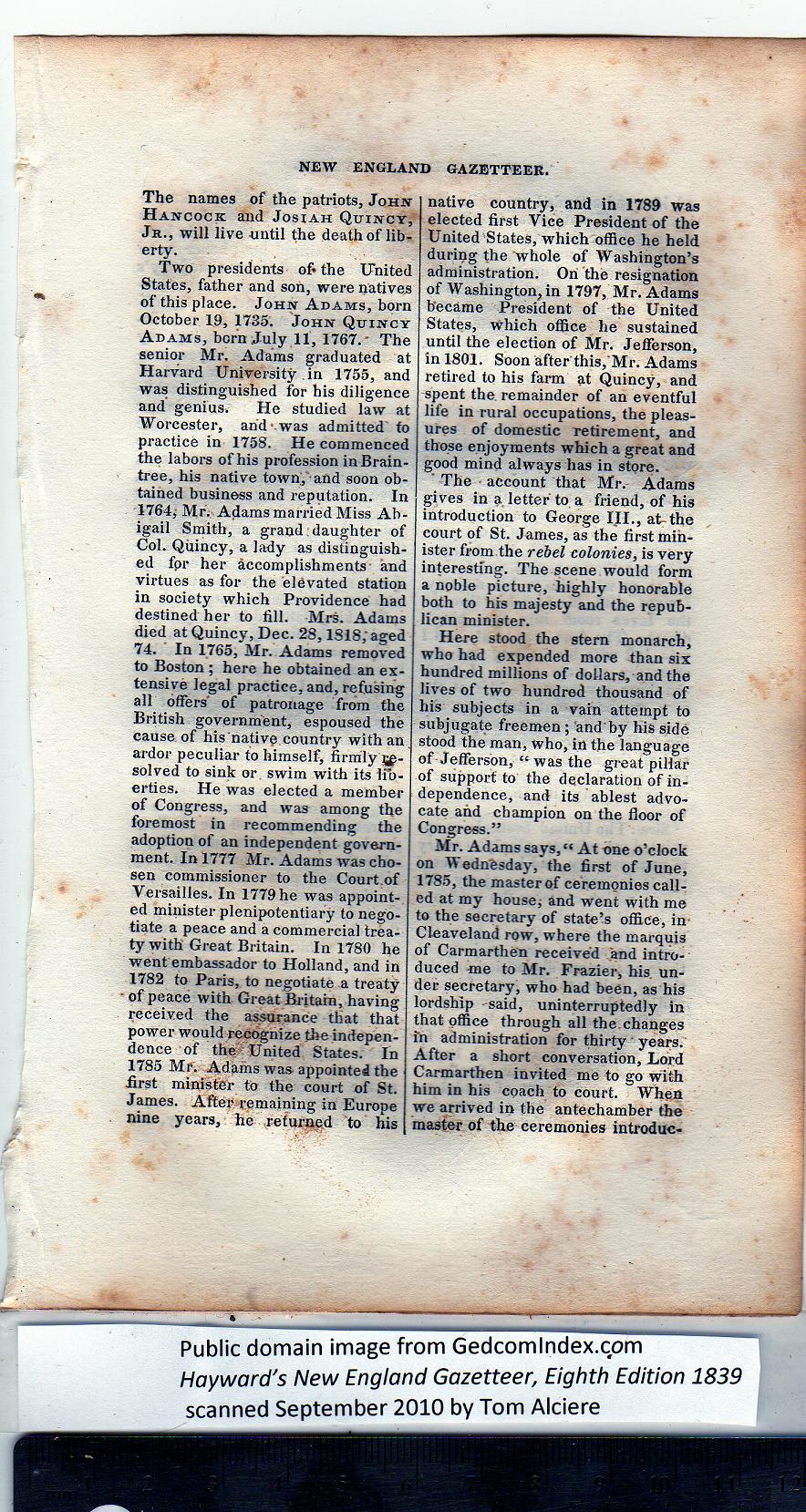|
The names of the patriots, John
Hancock and Josiah Quincy,
Jr., will live until the death of lib-
erty.
Two presidents of* the United
States, father and son, were natives
of this place. John Adams, born
October 19, 1735. John Quincy
Adams, bcrn July 11, 1767.' The
senior Mr. Adams graduated at
Harvard University in 1755, and
was distinguished for his diligence
and genius. He studied law at
Worcester, arid- was admitted to
practice in 1758. He commenced
the labors of his profession in Brain-
tree, his native town, and soon ob-
tained business and reputation. In
1764; Mr. Adams married Miss Ab-
igail Smith, a grand: daughter of
Col. Quincy, a lady as distinguish-
ed fpr her accomplishments and
virtues as for the elevated station
in society which Providence had
destined her to fill. Mrs. Adams
died at Quincy, Dec. 28,1818; aged
74. In 1765, Mr. Adams removed
to Boston ; here he obtained an ex-
tensive legal practice, and, refusing
all offers of patronage from the
British government, espoused the
cause of his'native country with an
ardor peculiar to himself, firmly
solved to sink or swim with its lib-
erties. He was elected a member
of Congress, and was among the
foremost in recommending the
adoption of an independent govern-
ment. In 1777 Mr. Adams was cho-
sen commissioner to the Court of
Versailles. In 1779 he was appoint-
ed minister plenipotentiary to nego-
tiate a peace and a commercial trea-
ty with Great Britain. In 1780 he
went embassador to Holland, and in
1782 to Paris, to negotiate a treaty
of peace with Great Britain, having
received the assurance that that
power would recognize the indepen-
dence of the United States. In
1785 Mr. Adams was appointed the
first minister to the court of St.
James. After remaining in Europe
nine years, he returned to his
native country, and in 1789 was
elected first Vice President of the
United States, which office he held
during the'whole of Washington’s
administration. On the resignation
of Washington, in 1797, Mr. Adams
became President of the United
States, which office he sustained
until the election of Mr. Jefferson,
in 1801. Soon after this, Mr. Adams
retired to his farm at Quincy, and
spent the remainder of an eventful
life in rural occupations, the pleas-
ures of domestic retirement, and
those enjoyments which a great and
good mind always has in store. |
‘ The • account that Mr. Adams
gives in a, letter to a friend, of his
introduction to George III., at-the
court of St. James, as the first min-
ister from the rebel colonies, is very
interesting. The scene would form
a noble picture, highly honorable
both to his majesty and the repub-
lican minister.
Here stood the stern monarch,
who had expended more than six
hundred millions of dollars, and the
lives of two hundred thousand of
his subjects in a vain attempt to
subjugate freemen ; irnd by his side
stood the man, who, in the language
of Jefferson, “ was the great pillar
of support to the declaration of in-
dependence, and its ablest advo-
cate and champion on the floor of
Congress.”
Mr. Adams says,“ At one o’clock
on Wednesday, the first of June,
1785, the master of ceremonies call-
ed at my house; and went with me
to the secretary of state’s office, in
Cleaveland row, where the marquis
of Carmarthen received and intro-
duced me to Mr. Frazier, bis un-
der secretary, who had been, as his
lordship said, uninterruptedly in
that office through all the changes
in administration for thirty years.
After a short conversation, Lord
Carmarthen invited me to go with
him in his coach to court. When
we arrived in the antechamber the
master of the ceremonies introduc- |
